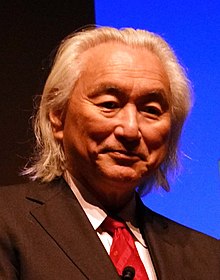Michio Kaku | |
|---|---|
 Kaku in 2020 | |
| Born | January 24, 1947 San Jose, California, U.S. |
| Education | Harvard University (BA) University of California, Berkeley (PhD) |
| Known for | Light-cone string field theory Physics of the Impossible Physics of the Future The Future of the Mind The God Equation |
| Spouse | Shizue Kaku |
| Children | 2 |
| Awards | |
| Scientific career | |
| Fields | Theoretical physics |
| Institutions | City College of New York New York University Princeton University Institute for Advanced Study |
| Thesis | Spin and Unitarity in Dual Resonance Models (1972) |
| Doctoral advisor | Stanley Mandelstam Robert Pound |
| Website | mkaku |
Michio Kaku (Japanese: カク ミチオ, 加來 道雄, /ˈmiːtʃioʊ ˈkɑːkuː/; born January 24, 1947) is an American physicist, science communicator, futurologist, and writer of popular-science. He is a professor of theoretical physics at the City College of New York and the CUNY Graduate Center. Kaku is the author of several books about physics and related topics and has made frequent appearances on radio, television, and film. He is also a regular contributor to his own blog, as well as other popular media outlets. For his efforts to bridge science and science fiction, he is a 2021 Sir Arthur Clarke Lifetime Achievement Awardee.[1]
His books Physics of the Impossible (2008), Physics of the Future (2011), The Future of the Mind (2014), and The God Equation: The Quest for a Theory of Everything (2021) became New York Times best sellers. Kaku has hosted several television specials for the BBC, the Discovery Channel, the History Channel, and the Science Channel.